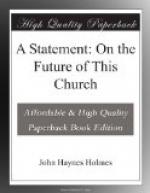“Jesus Christ and the Social Question “—was
published in 1903, the year before my ordination.
I was not unprepared for what was coming. My
deep-rooted reverence for Theodore Parker, the supreme
prophet of applied Christianity in our time, and my
enthusiastic study of his life, had revealed to me
the meaning of socialized religion. But I had
caught only the pure essence of its spirit; I had
not thought to apply it to the social problems of
today. Indeed, I was not aware of the existence
of such problems. My whole approach to the question
of truth and experience up to that time, had been
along the lines of speculation in the field of theological,
as contrasted with political or social, thought.
In the second year of my ministry, however, I read
Henry George’s “Progress and Poverty”;
then followed the writings of Henry D. Lloyd and Prof.
Walter Rauschenbusch; then came the deep and prolonged
plunge into the waters of socialism. For several
years after I came to this church, I was in a state
of intellectual and emotional upheaval impossible
for me to describe. At last came a conviction
which was a complete reversal of all my former ideas.
I was as a man converted; I was as one who had seen
a great light. Henceforth I was a social radical;
and religion, pre-eminently not a testimony to theological
truth but a crusade for social change. Of course,
my interest in theology has persisted; but its place
in my life has tended to become ever more subordinate
to other and more directly practical interests.
You know how the character of my preaching has changed
since I first entered the Messiah pulpit. You
know with what [8] waxing intensity of expression I
have moved to the left of our various divisions on
the social question. You do not know, hence I
must tell you, how this intensity of radical conviction
is destined to continue in the years that are now before
us. For the war has accelerated the social crisis
beyond all forecasting. In two years has transpired
what fifty years could not have consummated under
more normal conditions. Three great empires—Russia,
Germany, Austria—and several newborn countries,
like that of the Czecho-Slovaks, have been captured
by the Socialists; and the British Empire seems promised
to the British Labor Party in not more than another
decade or two. The social revolution long prophesied,
long hoped for, long feared, is here; and this means
in countries like our own, still untouched by change,
such a “sturm and drang periode,” as makes
even the Great War pale into insignificance.
Now in these years which are before us, I propose
to speak and serve for the speediest and most thoroughgoing
social reconstruction. I am committed both by
conviction and temperament to the program of the British
Labor Party and its policy of indirect or political
action for the advancement of that program. This
is my predominant interest at this moment, and through
what is destined I suppose to be the whole period
of my life. This is as much the cause of our
day as abolition was the cause of the days before
the Civil War. To this I have given all I have—from
this I intend to withdraw nothing that I have given.
Not in any sense of bitterness or violence in method,
but in every sense of utter change as the end desired,
I am committed to the ideal of the complete democratization
of society.




